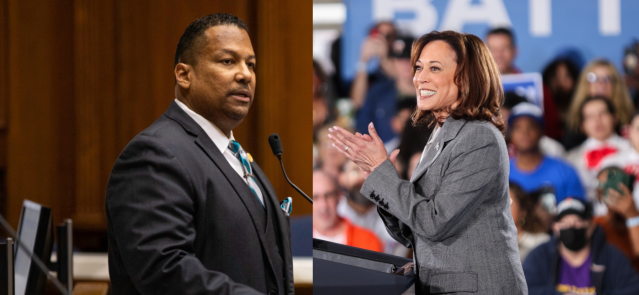Stay ahead of the curve as a political insider with deep policy analysis, daily briefings and policy-shaping tools.
Request a DemoOur first responders are among the bravest and most selfless members of our community here in House District 32, and I consider it my duty as state representative to support them with the resources they need to get the job done. But unfortunately, being the first person to run into a fire, active shooter situation or another emergency comes with a psychological toll.
Our first responders’ mental health is often overlooked because these positions are inherently recognized to be held by strong-minded and fearless people, and so we forget that underneath every uniform is a person. What they see through their eyes and experience in the field should not be minimized simply because it is a part of the job. Additionally, stigma, lack of resources and research have all been cited as long-time barriers for first responders to seek mental health treatment.
Unfortunately, this stigma has claimed the lives of too many first responders. A study from 2018 found that more police officers and firefighters die by suicide than in the line of duty. For firefighters, the risk of suicide is 10 times more likely than that of the general population. These heroes stare down trauma and horrifying acts on a daily basis in the line of duty. As a result, they’re more vulnerable to PTSD, depression, suicidality and other mental and behavioral health conditions.
A bill I’ve authored, House Bill 1321, will begin to address this silent epidemic in our community and across the state. It’s an opportunity for Indiana to lead, to serve as an example of how to address first responder mental health in an evidence-based manner.
This bill will require annual in-service virtual training for all first responders, including the professions of law enforcement, full-time professional firefighters and EMS. The training will address mental health and wellness and suicide prevention. This resource will not only preserve anonymity but help deal with thoughts of suicide, trauma and other mental or emotional obstacles in order to reduce stress and anxiety.

“We see you, we hear you, you are not alone.” This is the message that Karie Phelps, the wife of a medically retired police officer who developed PTSD during his law enforcement career, has for Hoosier first responders.
“Would Jeff be in the same place if this training would have been available? We will never know,” Phelps said in her testimony in support of HB 1321. “I can’t believe he would be. If he had the proper knowledge of how to deal with traumatic and critical events from the beginning of his career instead of the mentality of just stuffing it and not processing the feelings and emotions, until the ‘stuff it’ bucket was full and starts to overflow with all the past traumas.”
Phelps is a founder of Behind Thin Lines, an organization that connects law enforcement officers with the right mental health treatment that is needed on an individual basis.
“Knowledge is power!” Phelps added. “So let’s give our first responders the power to deal and cope with their day-to-day trauma and critical incidents.”
This crisis is personal to me, too. My husband is a retired law enforcement officer, so I know how important first responder mental health is firsthand. I want to see that each and every first responder is supported and heard.
The mental health crisis some heroes live through is clear to me, and nobody should feel alone or afraid. I am committed to providing a space to foster healthy relationships and make positive steps towards a peaceful life for first responders who are our neighbors, loved ones and friends.
We have an ethical responsibility to take care of the people who take care of us — and this bill is one way to make positive strides toward that goal.
State Rep. Victoria Garcia Wilburn, D-Fishers, was elected on Nov. 8, 2022. She is a member of the Family, Children and Human Affairs Committee; the Employment, Labor and Pensions Committee; and the Judiciary Committee. Garcia Wilburn holds a degree in occupational therapy and a doctorate in health science and has served as a clinician, health researcher and public health advocate in her community. Garcia Wilburn and her husband, Christopher, a former police officer, have three children.
4 things to know about Braun’s property tax proposal
Sen. Mike Braun, the Republican candidate for Indiana’s governor, released a plan for overhauling property taxes Friday morning that would impact millions of Hoosiers, Indiana schools and local governments. “Nothing is more important than ensuring Hoosiers can afford to live in their homes without being overburdened by rising property taxes driven by rapid inflation in …
Bureau of Motor Vehicles looks to add new rules to Indiana’s driving test
The Bureau of Motor Vehicles wants to amend Indiana’s driving skills test, putting “existing practice” into administrative rule. Indiana already fails drivers who speed, disobey traffic signals and don’t wear a seatbelt, among other violations. Yet the BMV is looking to make the state’s driving skills test more stringent. A proposed rule amendment looks to …
In Indianapolis, Harris says she’s fighting for America’s future
Vice President Kamala Harris, the presumptive Democratic presidential nominee, told a gathering of women of color in Indianapolis on Wednesday that she is fighting for America’s future. She contrasted her vision with another — one she said is “focused on the past.” “Across our nation, we are witnessing a full-on assault on hard-fought, hard-won freedoms …
Indiana Black Legislative Caucus endorses Harris, pledges future support
The Indiana Black Legislative Caucus unanimously voted Wednesday to endorse Vice President Kamala Harris’ presidential run and will look at ways to assist her candidacy, the caucus chair, state Rep. Earl Harris Jr., D-East Chicago, told State Affairs. The caucus is made up of 14 members of the Indiana General Assembly, all of whom are …





